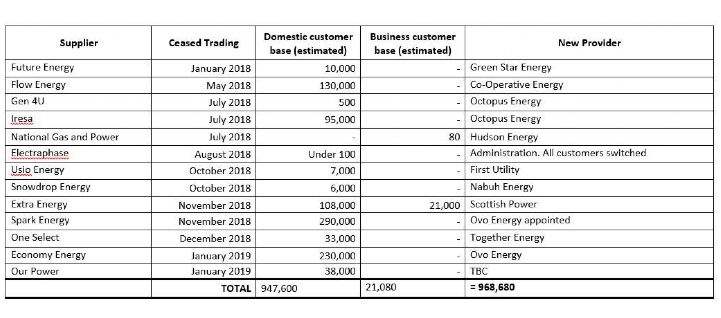Over the last 12 months, 13 energy providers in the UK have gone into liquidation (see table, below), as Ofgem, the GB energy regulator, tightens regulations and wholesale prices rise.

Source: www.ofgem.gov.uk & www.ukpower.co.uk/gas_electricity_news/why-are-energy-firms-going-bust
With a significant number of small energy firms closing their doors, is this a sign of harder times to come and more energy firms facing the same fate?
There are now more than 70 energy companies in the UK, including a raft of small suppliers, and it is safe to say that the market is saturated, with each provider trying to under-cut prices and rates to attract new customers.
However like every business, profit margins need to be met, costs need to be considered and taxes need to be paid. It’s easy to see how the smaller providers are able to offer a cheaper price as their operational and taxation costs are not as large as the big six (British Gas, EDF Energy, E.ON, Npower, Scottish Power and SSE).
But is it worth the risk switching from larger suppliers to a smaller provider, in order to save a couple of pounds on your utility bills?
With size comes equity, something that smaller providers don’t have, leaving them vulnerable to sudden increases in wholesale prices as they cannot buy as much energy in advance. This risk in the wholesale market is a fact customers don’t see and are unaware of, meaning any decision to switch to a cheaper energy provider is purely based on the potential savings on an immediate term, without appraising the security of their supply.
The latest worry affecting the potential stability of the UK energy industry is Yu Group, a small energy provider, which has issued a profits warning and its share price has collapsed.This was due to a poorly judged profits forecast linked to inadequate provisions for bad debts and customers using less energy than expected.
There is also uncertainty amongst the big six providers following the failed merger of SSE and Npower and the subsequent transfer of Npower’s ownership to German energy giant E.ON leaving some 6,400 UK based employees concerned for their job security.
In terms of how this all affects us, the consumer, there is no reason to worry. However, it is important to be aware that after the initial switch to the new appointed supplier, your contract prices and rates will have to be re-negotiated, which may well lead to your utilities being as expensive, if not more so, than the average rates.
With the market currently being very unpredictable and wholesale prices continuing to rise, we could well see more of the smaller firms cease trading and more movement between the big six.
Domestic consumers and businesses are advised to look at alternative means of reducing costs, such as installing smart meters, energy efficient equipment, active market monitoring and being more involved with news relating to the energy industry.

.jpg)







.jpg)
.jpg)